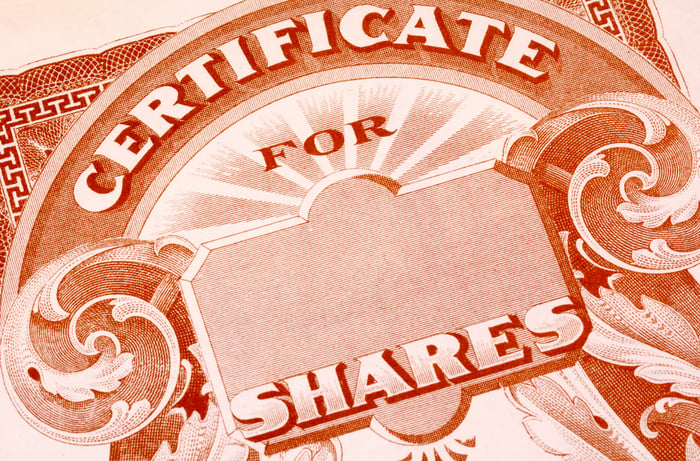When the going gets tough on Wall Street, professional and everyday investors have a tendency to seek out profitable, time-tested, industry-leading businesses to lead them through the storm.
For the past decade, the FAANG stocks have been a staple for investors looking for consistency and outperformance. But over the past two years and change, stocks enacting splits are the ones that have delivered the bacon for investors.

Image source: Getty Images.
Nine high-profile stock-split stocks have been bona fide outperformers
A stock split is an event that allows a publicly traded company to cosmetically alter its share price and outstanding share count while having no impact on its market cap or operating performance. A forward-stock split is designed to make a company's shares more nominally affordable for retail investors. Meanwhile, reverse-stock splits ensure a company's share price meets the requirements for continued listing on a major exchange.
Most investors hone in on companies enacting forward splits. That's because businesses conducting forward-stock splits are typically highfliers that are out-executing and out-innovating their competition.
Since the midpoint of 2021, nine top-tier stocks have enacted stock splits:
- Nvidia (NVDA 6.18%): 4-for-1 split
- Amazon (AMZN 3.43%): 20-for-1 split
- DexCom (DXCM -9.90%): 4-for-1 split
- Shopify (SHOP 1.11%): 10-for-1 split
- Alphabet (GOOGL 10.22%) (GOOG 9.96%): 20-for-1 split
- Tesla (TSLA -1.11%): 3-for-1 split
- Palo Alto Networks (PANW 0.91%): 3-for-1 split
- Monster Beverage (MNST 0.41%): 2-for-1 split
- Novo Nordisk (NVO 0.84%): 2-for-1 split
Even Wall Street's most-revered investor, Berkshire Hathaway (BRK.A -0.76%) (BRK.B -0.69%) CEO Warren Buffett, has north of $1.5 billion currently invested in a prominent stock-split stock. I'm talking about e-commerce kingpin Amazon, which has been a continuous holding since the first quarter of 2019.
Typically, high-flying outperformers sport hefty valuation premiums. Many of the nine stock-split stocks listed here trade at aggressive earnings multiples, and would thus be off the radar of the traditionally value-focused Warren Buffett. It's why electric-vehicle maker Tesla, cloud-based e-commerce platform Shopify, and continuous glucose monitoring company DexCom, which respectively sport forward price-to-earnings (P/E) ratios of 66, 74, and 71, have no chance of being purchased by the Oracle of Omaha.
There is, however, one stock-split stock that's historically inexpensive and makes for the likeliest addition to Berkshire Hathaway's portfolio in 2024 by Warren Buffett and/or his investing lieutenants, Todd Combs and Ted Weschler.

Image source: Getty Images.
Meet the stock-split stock Warren Buffett is likeliest to buy in 2024
The superstar stock in question that the Oracle of Omaha would be likeliest to buy in the new year is Alphabet, the parent company of internet search engine Google, streaming platform YouTube, and a host of other ventures.
Even though Berkshire Hathaway has never owned shares of Alphabet, Buffett has previously expressed regret for not taking the plunge. During Berkshire's annual shareholder meeting in 2017, Buffett admitted that not understanding the value proposition of companies like Alphabet and Amazon a long time ago was a costly mistake.
But after more than 19 years as a publicly traded company, Alphabet checks all the boxes Warren Buffett and his investing aides would look for when putting Berkshire Hathaway's enormous cash pile to work.
Most notably, Alphabet's moat in internet search looks to be impenetrable. Data from GlobalStats shows that Google accounted for an astonishing 91.54% of worldwide search share in November. You'd have to go back to March 2015 to find the last month that Google didn't tally at least 90% of global monthly search share.
Having a virtual monopoly in internet search makes Google the undisputed go-to for advertisers looking to target consumers with their message(s). It also affords Alphabet's subsidiary plenty of ad-pricing power.
Even though the Oracle of Omaha isn't the most tech-savvy investor, Buffett understands consumer habits very well. YouTube is attracting more than 2.7 billion monthly active users each month, and has seen daily viewership for Shorts (short-form videos often lasting less than 60 seconds) jump from 6.5 billion to more than 50 billion since 2021. Like Google, YouTube is commanding exceptional ad-pricing power.
It should be noted that Warren Buffett, Todd Combs, and Ted Weschler aren't afraid to invest in ad-driven businesses. This dynamic trio has overseen the steady increase of Berkshire's stake in media stock Paramount Global over the past two years. Buffett and his team fully understand that while recessions are an inevitable part of the economic cycle, periods of expansion last substantially longer. Buying into historically dominant, cyclical, ad-driven businesses can be a winning formula for long-term investors.
The Oracle of Omaha and his team also are big fans of companies that reward patient investors. Although Alphabet doesn't offer a dividend -- it makes no sense for the company to pay a dividend when it's aggressively reinvesting in high-growth initiatives, such as Google Cloud -- it does have one of Wall Street's most-impressive capital-return programs.
In April, the company's board authorized $70 billion in share repurchases. Since this decade began, Alphabet has bought back $186 billion worth of its common stock. These buybacks are increasing Alphabet's earnings per share, which is making an already fundamentally attractive stock that much more palatable for value seekers.
Lastly, the valuation makes sense with Alphabet. Thanks to the guidance of the late, great Charlie Munger, Warren Buffett and his investing team have developed an appreciation for buying wonderful businesses at a fair price.
Alphabet is currently trading for 21 times forward-year earnings, right on par with the forward P/E ratio of the benchmark S&P 500. What the S&P 500 doesn't have is Alphabet's expected annualized earnings growth of 19.5% over the next five years. Alphabet is also trading at its lowest multiple to forward cash flow since going public in 2004.
If there's a stock-split stock Warren Buffett and his team are primed to buy in 2024, it's unquestionably Alphabet.





